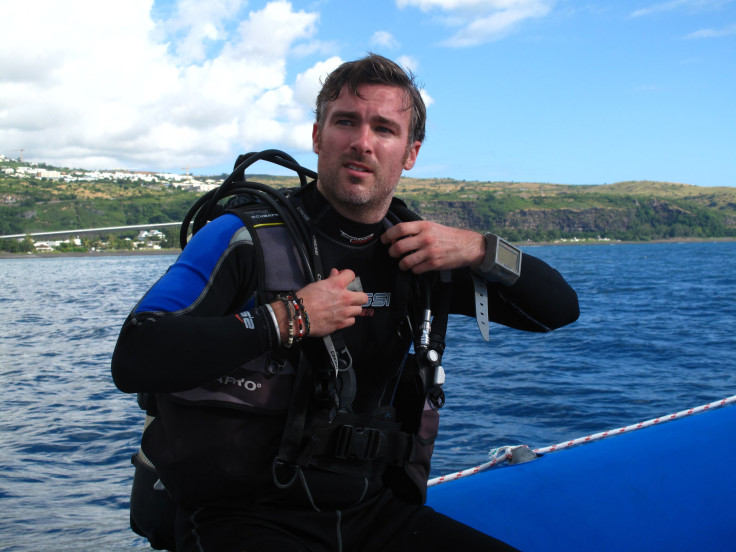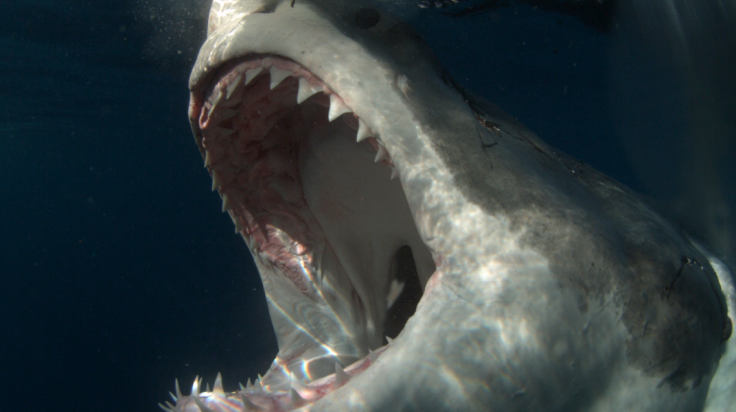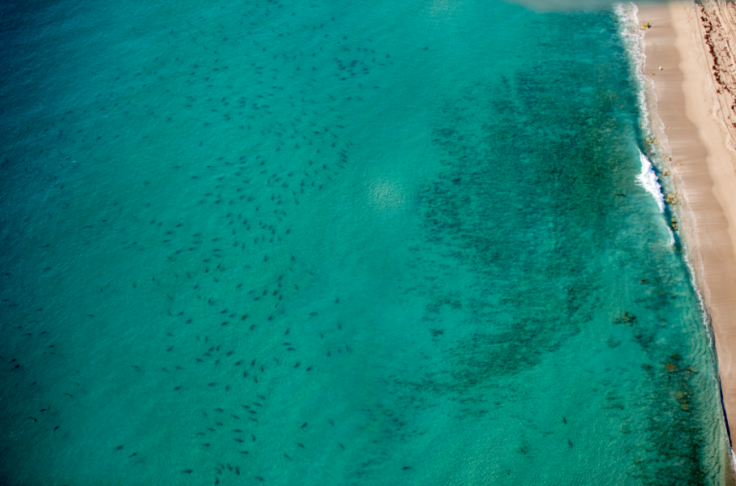Shark Week Star Dr. Craig O'Connell Shares His Thoughts On 'Shark Island,' North Carolina Shark Attacks

It’s the summer of the shark. Not only are the toothy creatures breaching our small screens during the 2015 installment of the week-long Discovery Channel series Shark Week, but the gilled animals are also swarming the eastern coast of the United States, which is where they’ve been caught attacking several beach-goers who dare step foot into the shark-infested waters.
International Business Times caught up with shark biologist Dr. Craig O’Connell, who is starring in the Shark Week episode “Shark Island,” to discuss the recent, grisly attacks off the shoreline of North Carolina. The Shark Week star, whose episode premieres Sunday, shares how the recent attacks are comparable to the incidents that have occurred in Réunion Island, a French island in the middle of the Indian Ocean that has also endured a surge of shark attacks. O’Connell recently traveled to Réunion to investigate the cause behind the deadly events, while researching ways to prevent any more fatalities.
Check out our interview with the New York-native below to find out his take on the attacks and get tips on how to stay safe this summer from the majestic predators swimming in the surf:
International Business Times: I saw an early screener of the upcoming Shark Week episode “Shark Island” and my hands were sweating as you dove into the chum-infested, murky waters of the Indian Ocean. What was that like for you?
Dr. Craig O’Connell: It was intimidating. I’ve been diving in South Africa outside the cage with sharks and I even had a white shark eat a seal right above my head. But there’s something about Réunion Island that had added a little bit extra to the situation. It was murky water – you hear about the sudden increase in shark attacks and I was definitely nervous. I was very intimidated. There are some interesting things that go on when I’m down there.
IBTimes: After watching that Shark Week episode, I saw a lot of similarities between what happened off the coast of Réunion Island and what’s currently going on in North Carolina. Would you say we’re currently in a shark crisis right now with the surge in attacks?
O’Connell: I wouldn’t say we’re in a shark crisis because that’s something that might stir up a little hysteria, I think. I just think if you look at the previous decade of shark attacks in North Carolina there’s been about one in five per year. Right now there’s seven so we’re slightly above normal.
But you also have to think there are a lot of people going in the water right now, you have optimal conditions for these sharks to come near shore, so unfortunately a couple accidents did happen between sharks and swimmers and surfers. But I wouldn’t necessarily say it’s a shark crisis.
IBTimes: We’re you shocked to hear about the various shark attacks in North Carolina?
O’Connell: I was a little bit shocked to hear about it – especially because they were so close together. It definitely is an interesting situation and, in fact, a very unique one. But it’s just something we need to be aware of and maybe a little bit more conscious of. Now we know there are sharks very close to shore and we have to take the proper precautions.
IBTimes: And what are those preventative measures?
O’Connell: There are a lot of things we can do to prevent them. First of all, we need to understand that the ocean is the shark’s environment. And so the second we step our feet into that environment, we are in their [territory]. So, we must be very conscious of that and once we take that into consideration we need to look at other things. Like it’s not very wise to go in the water early in the morning or late in the afternoon when the sharks are feeding more frequently. It’s not very wise to go in the water alone. It’s better to go with a group of people – this tends to keep sharks a little bit further away.
If you’re swimming off on your own, the sharks less intimidated. But if you create a lot of commotion in the water with your group – sharks generally are very shy animals and so they’ll tend to stay away. Not 100 percent, but it will reduce the likelihood of an encounter.
And if you do see a lot of bait around, a lot of fish – you see birds diving, this could be an indication that there are sharks in the area because where there’s prey, there’s usually the predators. If we see those particular things, it’s best not to go in the water.
IBTimes: Do you know what’s causing the surge of shark attacks in North Carolina – what’s drawing them to that area?
O’Connell: We can’t necessarily say an exact thing. There are a lot of scientists saying that it could be a combination of variables and I agree with that. It could be the warmer temperatures in that area. It could because there was a recent drought condition, which makes it more favorable for the sharks to come closer into shore. You also have a lot of bait moving along the shoreline and you have the recent sea turtle hatchlings swimming along the shore. So those a three particular things that could contribute to the shark attack situation. But the other thing we need to recognize is that schools out – it was just one of the most popular times of the year to go to the beach, July fourth weekend, and so you have a lot of people going into the water. And if you have more people in the water you have an increase probability that there’s going to be an interaction with between a shark and a swimmer/surfer.
IBTimes: So it is currently turtle nesting season. How much longer does that last?
O’Connell: I couldn’t tell you specifically how long it’s going to last. But it’s something that is occurring and has occurred over the past few weeks. But I couldn’t tell you the duration of it. But it’s not just the sea turtles [that are attracting sharks]. We also have Menhaden that are coming along the shoreline, which is a very oily fish. They tend to swim in very, very big groups and sharks tend to follow them.

IBTimes: What would make a shark want to attack? Are these bites caused by curiosity? Or are these sharks looking for blood?
O’Connell: The only thing we need to understand about sharks is that they don’t have hands – and they are very curious. So, they tend to investigate things with their mouths and unfortunately, they have a really, really sharp set of teeth. And so, when we’re on the other side of that situation it could be quite devastative. So, yes curiosity could be one potential reason. But I think one of the key reasons why sharks may attack is just a case of mistaken identity. We’re talking about these sharks coming very close to shore, in very murky water where they can’t necessarily see their prey and they may mistake us for their prey and give us a little bit of a bite. And that’s when you have these unfortunate encounters. But I wouldn’t say they’re targeting people because if they were, the beach would be a very bloody place – and it’s not.
IBTimes: What should one do if they happen to find themselves face-to-face with a shark?
O’Connell: There are a lot of different methods of getting out of a shark attack and I can’t necessarily say which ones going to be better. But one of the best things to do is get out of the water as quickly as possible. People say you can punch the shark in the snout, eyes or gills – in their vulnerable locations – but I don’t have any specific evidence that that works. And so my answer to that is get out of the water as quickly as they can so they can stop the blood and you can get to the hospital.
IBTimes: Should we be fearful of sharks following these attacks?
O’Connell: I don’t think we should ever fear sharks – they’re beautiful animals and deserve our respect. But we should be weary of them. Right now in North Carolina we know they’re swimming along the shoreline and we have to understand that. It’s their territory and we should respect that. Maybe it’s not the best idea to go in the water at dawn or dusk. But I don’t think we should be absolutely fearful of these animals.
IBTimes: During the Shark Week episode “Shark Island,” you said that you were inspired by a previous Shark Week installment to help sharks and people coexist. Do you think “Shark Island” will do the same and inspire others?
O’Connell: Yeah, hopefully it will inspire some more people. This is why I have my passion today because Shark Week inspired me. So I’m hoping that episode will do the same exact thing for other children. Maybe they’ll see it and they’ll want to protect sharks and save sharks. That’s exactly why I think Shark Week exists – one of the key reasons because it’s inspiring people, promoting awareness and making people realize the beauty of these sharks.
IBTimes: I was wondering if you thought Shark Week was beneficial to sharks. Some critics say otherwise.
O’Connell: I think [Shark Week] promotes awareness -- especially this year they’ve taken a very good turn. They’re focusing on reality and focusing on a lot of new science. And this will inspire not only me, but also the community. Maybe some of these young children who are watching will want to protect sharks and become future ambassadors of the ocean. So I think [Shark Week] is very positive.
IBTimes: What are you most excited for fans to see on “Shark Island”?
O’Connell: I think it’s going to be exciting for people to see the novel ways that [the community of Réunion Island] is approaching the shark crisis. It’s not necessarily just technology – there are other things in that episode that the local community is doing to help prevent these shark attacks. And it was super exciting for me to see because I didn’t know it existed. And it think that’s something that people should really look forward to.
IBTimes: I saw in that episode that some of the Réunion Island locals were responding very negatively to the shark attacks to the point where they wanted the animals to be killed. Do you foresee something like that happening in North Carolina?
O’Connell: I’ve heard, after the first several attacks, that the government was going to initiate a cull and go out and kill some of the sharks that are responsible. And this, in my opinion, is a very short-sided approach. We saw this in Western Australia and I think it’s something that these governments should greatly reconsider. Because their concept is to kill these sharks to minimize the potential future interaction between sharks and swimmers and what we need to understand is the ocean is the sharks’ environment. And by killing these sharks to make it more convenient for us is completely disrespectful and saddening. And so I think we need to take a step back and think in long term. Because if we think in short term, we’re going to continue to remove these sharks from the environment and we might see an environmental catastrophe.
IBTimes: I heard the number of sharks has decreased significantly. Do you have statistics that bolster that?
O’Connell: What we can say from some of the published studies is that approximately 100 million sharks are being killed every year. And this to us is alarming because the reason being is that sharks have very few young, they grow really slow and they mature at a late age. So when you remove too many of them from the environment it’s very hard for their population to recover. So if you’re removing 100 million sharks from the environment that means the shark population isn’t doing well at all.

IBTimes: Do you know what type of shark was responsible for the attacks in North Carolina?
O’Connell: Sharks that frequent the coastline [in that area] are bull sharks, blacktip sharks and tiger sharks. And blacktips are responsible for a lot of attacks in Florida – just small bite wounds. So it’s possible its one of those three species that’s causing the attacks in the area. But we can’t necessarily say for certain because we don’t have firm evidence.
IBTimes: What do you think it would take to get people back in the water?
O’Connell: I think people need to pay attention to the risks. And maybe these conditions are going to dissipate over time. But give it a little bit of time these sharks are going to move and then the situation will get better in that area.
Shark Week's "Shark Island" will air on Sunday, July 12, at 8 p.m. EDT on Discovery Channel.
© Copyright IBTimes 2024. All rights reserved.











